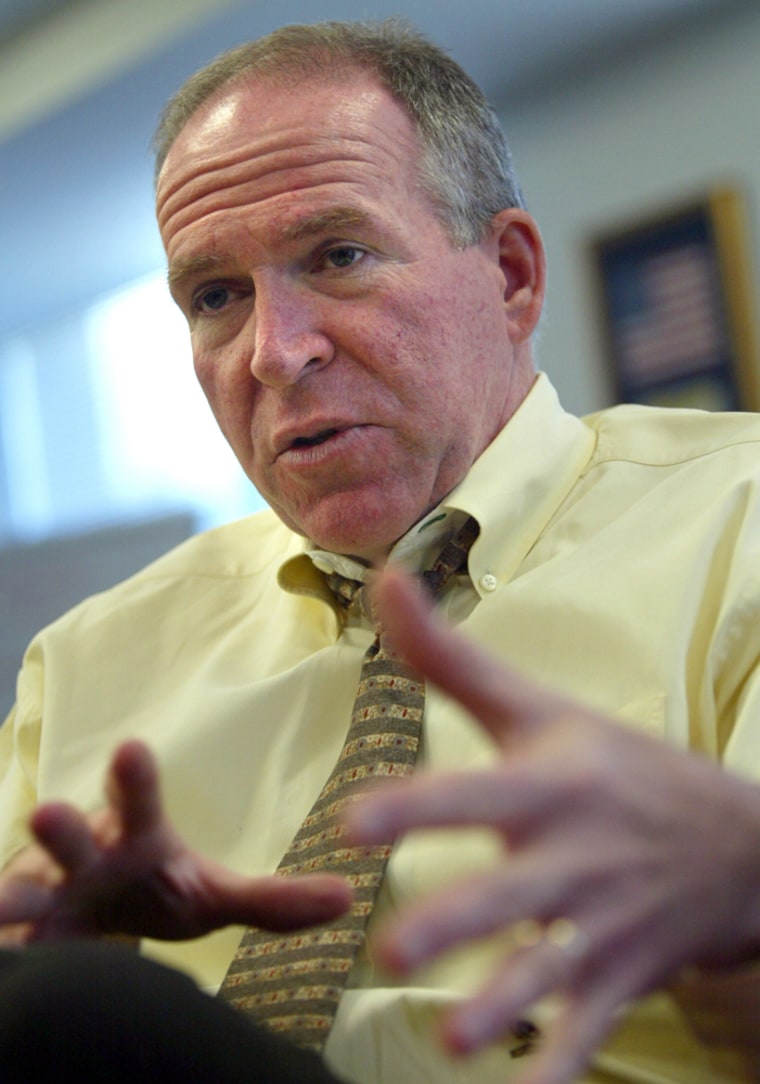President-elect Barack Obama is preparing to scrap the way President Bush oversaw domestic security in the White House and name a former Central Intelligence Agency official to coordinate counterterrorism, people close to the transition said Wednesday.
The plan being discussed would eliminate the independent homeland security adviser’s office and assign those duties to the National Security Council to streamline sometimes overlapping functions. A deputy national security adviser would be charged with overseeing the effort to guard against terrorism and to respond to natural disasters.
Democrats close to the transition said Mr. Obama’s choice for that job was John O. Brennan, a longtime C.I.A. veteran who was the front-runner to head the spy agency until withdrawing in November amid criticism of his views on interrogation and detention policies. His appointment would not require Senate confirmation.
Mr. Obama has made no final decision about how to structure domestic security in his White House, and advisers plan to wait until his inauguration to conduct a formal review. But many key advisers have publicly advocated folding it into the National Security Council, and those involved in discussions said the only real questions appeared to be how to do that and how to explain it without looking like domestic security was being downgraded as a priority.
Mr. Bush first appointed a homeland security adviser after the Sept. 11 attacks, and Congress later institutionalized a Homeland Security Council inside the White House. The adviser holds the rank of assistant to the president, equivalent to the national security adviser, and reports directly to the Oval Office.
“It’s pretty clear they’ve made the decision,” said Frances Fragos Townsend, who was homeland security adviser under Mr. Bush and has talked with the Obama team about the issue. “It’s a question of timing and how they’re going to roll it out.”
Mr. Bush’s aides, including the national security adviser, Stephen J. Hadley, have privately urged Mr. Obama’s advisers not to get rid of the separate homeland security office, warning that it would load too many responsibilities on the National Security Council and risk important matters’ falling through the cracks.
The likely selection of Mr. Brennan to take over domestic security issues in the White House represents a turnaround. Mr. Brennan, a former C.I.A. officer in the Mideast who served as the first director of the National Counterterrorism Center, was seen as the favorite for C.I.A. director after the Nov. 4 election. But he abruptly pulled out after critics of Mr. Bush sharply criticized Mr. Brennan for past comments that seemed to defend C.I.A. operations after Sept. 11. Mr. Brennan defended his record and called himself an opponent of the harsh interrogation methods used in recent years.
In his new capacity, Mr. Brennan would report to Gen. James L. Jones, the retired Marine commandant slated to serve as Mr. Obama’s national security adviser. Dozens of aides now working for the homeland security adviser would largely be incorporated into the N.S.C. staff. The cabinet Department of Homeland Security would not be affected by any of these moves.
The idea of merging the two councils has been recommended by a number of reports, most notably in November by the Center for American Progress Action Fund and by Third Way. Among those preparing their report were John D. Podesta, Mr. Obama’s transition co-chairman, and members of his team.
The report argued that domestic security is inextricably tied to the nation’s broader foreign and military policy making.
“It was an artificial distinction to begin with,” said Matt Bennett, vice president of Third Way. “Homeland security is a function of national security in its purest form.”
C. Stewart Verdery Jr., a former assistant secretary at the Department of Homeland Security under Mr. Bush, said putting domestic security under the national security adviser would focus more attention on those matters, not less.
“It was very hard to get D.H.S. on the N.S.C. radar,” Mr. Verdery said. “You want your issues considered. You don’t want to be off in some second bucket.”
But some state officials are skeptical. “The National Security Council is focused outside,” said Nancy Dragani, director of the Ohio Emergency Management Agency and president of the National Emergency Management Association. “They’re not going to be, nor should they be, consumed with worrying about what’s happening in Ohio.”
'Concerned'
Senator Susan E. Collins of Maine, the ranking Republican on the homeland security committee, said, “If the Homeland Security Council were to be merged with the National Security Council, I would be concerned that insufficient attention would be devoted to homeland security issues.”
Ms. Townsend, who held the job until about a year ago, said the council should remain independent, but acknowledged pros and cons. In fact, she said, she recommended to Mr. Hadley and his predecessor, Condoleezza Rice, that they assume responsibility for domestic security, but both persuaded her they already had too much to do.
Still, Ms. Townsend added that fellow Republicans should not use the organizational change to accuse Mr. Obama of not caring as much about domestic security.
“That’s nonsense,” she said.
This story, , originally appeared in the New York Times.
